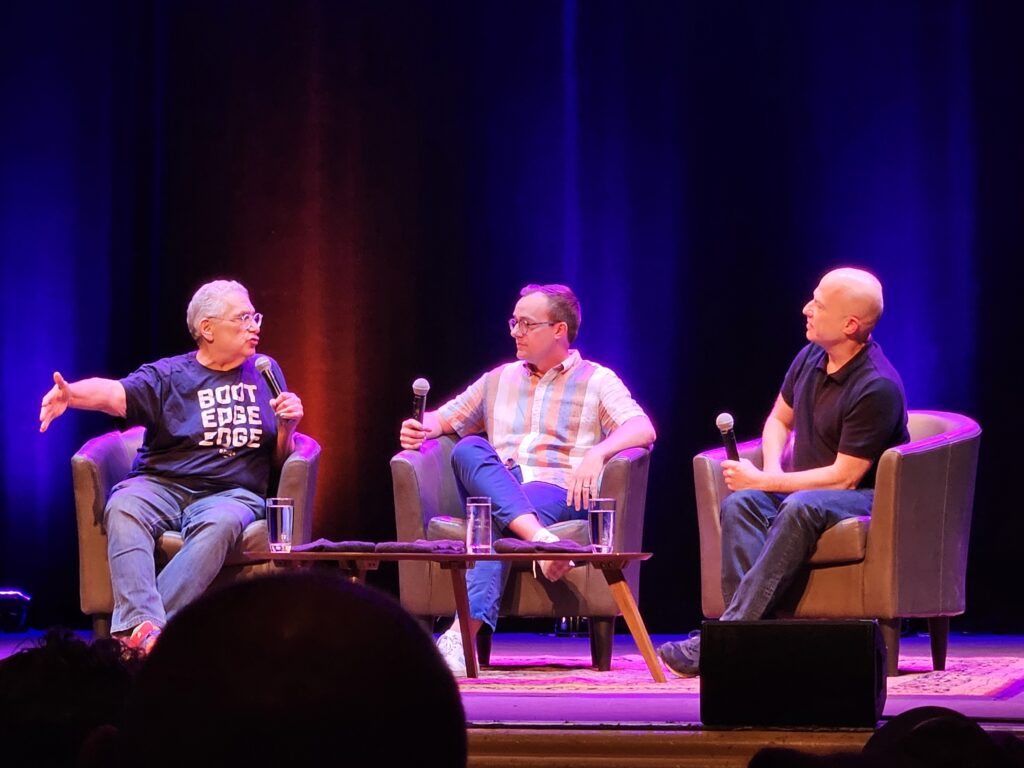There was nothing but love and admiration from the audience for trailblazers Chasten Buttigieg, Harvey Fierstein and Richie Jackson, who spoke with grace, humor, and a tremendous sense of pride at Ridgefield Playhouse on Friday evening, June 16. The event was a stop on Chasten’s tour across 20 U.S. cities promoting his memoir, I Have Something to Tell You.
Despite generational differences among the three guests, there were marked similarities in their individual experiences growing up gay, coming out, building careers and families, and living authentically.
“Growing up in rural Michigan, everything I knew about being gay was that it was bad,” said Chasten, who is married to Pete Buttigieg, current secretary of the U.S. Department of Transportation under the Biden administration and the first openly gay man to run for the office of U.S. president. “And just when I was coming into my own sexuality, Matthew Shepard’s murder happened.”
Richie Jackson, who served as executive producer of the hit show Nurse Jackie and recently published his own memoir, Gay Like Me, had a similar experience. “I had first heard that being gay was wrong from a fourth grade teacher,” he explained. “And I personally knew I liked boys as young as third grade. So, it became this incredible secret.”
Harvey, a renowned theater and film actor as well as producer and author who calls Ridgefield and Connecticut home, recalled a priest teaching him that being gay was a bad thing.
“I never could work up the courage to hand my mom a letter telling her that I was gay,” Chasten recounted. “And at that point in my life, I saw only two options: end it or run away. So, at 18 years old, I left.”
For this very reason, Chasten repurposed his original memoir to connect with a young-adult audience as well. “I wrote the book that I wish I had access to in eighth grade, or when I was 18 and hated myself, needing to know that there were others out there just like me,” he said.
Richie believes Chasten’s book comes at a critical time when more than 529 anti-LGBTBQ+ bills have been introduced this legislative session.
“I hope my book is irrelevant one day,” Chasten responded.
Despite the current challenges facing the LGBTQ+ community, all three acknowledge progress in the fight for equality since coming to terms with their own sexuality years ago.
“I remember growing up thinking I would never see a ring on this finger,” Chasten began. “Now, Pete and I have a loving marriage where we support each other in our careers,” he beamed, “and we are loving parents.”
For Richie, living openly in a same-sex marriage and as a gay parent is a daily form of activism. “There are some in the gay community who say that a lot of us are trying to be heteronormative,” he said. “But being a gay parent–attending a parent-teacher meeting, dropping your kids off at school, being in these places that were constructed with heterosexual families in mind–is truly a radical act.”
Harvey noted younger generations’ views on and approaches to LGBTQ+ issues. “Seeing so many kids at Ridgefield’s Pride in the Park celebration this year–gay kids, transgender kids, straight kids–felt like the war is over,” he said. “Trust me, I know it’s not! But it was nice to see that we’ve come a long way. When I wrote Torch Song Trilogy, none of this seemed possible.”
Richie has witnessed the same optimism in his son, who is also gay. “When my son first came out, he told me, ‘dad, it’s not a big deal anymore,’” he said. Richie, who wrote Gay Like Me as a response to that statement, later came to read between the lines of that statement to recognize a sense of hope and optimism.
Both Chasten and Richie believe society would not be at this point without the contributions of activists such as Harvey.
“Harvey didn’t wait until he was famous to come out,” Richie said. “He started his career already out. Nobody had done that before, and that’s Herculean.”
“It was and still is so brave,” Chasten added, before noting that “straight people have to step up and join the fight now” as a new form of bravery and to ensure we keep moving forward.
As far as what activism might look like for Pete and him in the future, Chasten is focused on the present. “Pete and I participated in something historic and remarkable when we ran the race for president,” he said. “Then, we became parents. And that changes everything.”
That joyous moment was followed by their son’s hospitalization for respiratory syncytial virus (RSV) and a cancer scare for Chasten that required surgery and a three-month healing period.
“Both of those circumstances – and what’s going on right now within our community – taught me what’s important and what can be taken so quickly,” he said. “Right now, I just want to be the best dad I can be.”
—Tom Ciuba









More Stories
Off Broadway Review: Data
Broadway Review: Bug
Off Broadway Feature: Audrey Heffernan Meyer in “Art of Leaving”